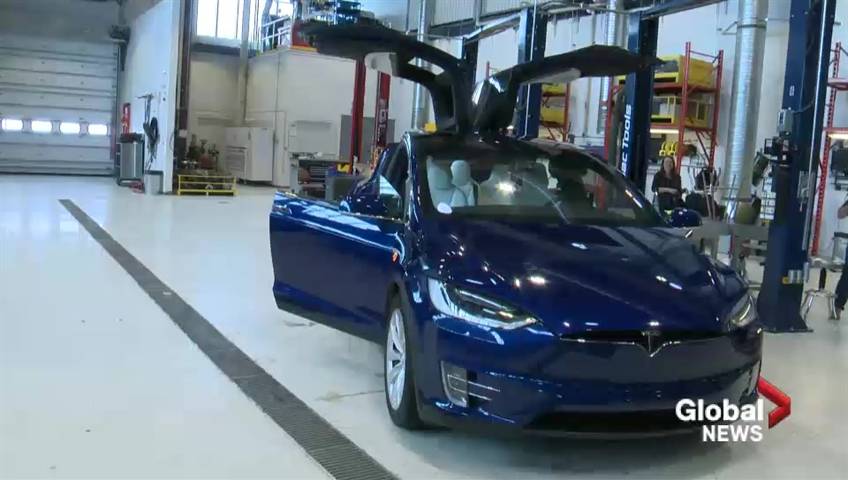In 2018, Brian Sexton decided to ditch his diesel vehicle for an electric one. His motivation: saving money.

“In our case, it was really driven by financial — the economics of it,” the Lethbridge, Alta., resident explained. “Going from a super-efficient diesel vehicle or gas vehicle to this one, we cut our fuel costs in half.”
Sexton said there are some misconceptions surrounding the expenses associated with electric vehicles. He purchased his used 2015 Nissan Leaf for around $17,500.
“When we thought ‘electric vehicles’ we thought Tesla, and we thought expensive,” he said. “Once we looked into it a little bit more, we discovered there was a used market out there, and the prices were reasonable.”
Read more:
Canada aiming to shift to all zero-emission electric vehicles by 2035: Federal government
Along with saving him money on gas, Sexton said his car needs very little maintenance and is quite reliable in the wintertime.
He says driving an electric vehicle in a city the size of Lethbridge is very doable just by charging at home.
“It takes a few hours to charge, but like your cell phone you just plug it in at night and you go about your evening or go to bed.”
Lethbridge has a handful of charging stations, at locations such as the ATB Centre and the Health Unit downtown.
“The Peaks to Prairies project has really made a significant effort to expand the number of charging stations around southern Alberta, not just in Lethbridge,” said Kathleen Sheppard. “So the infrastructure is there.”
Sheppard, executive director of Environment Lethbridge, is pleased to see an increase in interest in electric cars in Canada. She said they go hand-in-hand with lowering emissions.

“For individuals, it can sometimes be a struggle to know where the right thing to do is,” she explained, “and we all drive perhaps a lot more than we should, so this is a way people can reduce their emissions.”
In May of 2019, the federal government introduced the Incentives for Zero-Emission Vehicles Program (iZEV), which provides up to $5,000 to incentivize the purchase of zero-emission vehicles, including plug-in hybrid electric vehicles.
“The growth is sort of occurring naturally just because electric vehicles are now available and they’re proven, but now we have (governments backing that up) with policy,” Sexton said.
“It’s small, but it’s growing.”
“After a few years with (hybrid) vehicles, we have a lot of people now requesting those vehicles,” said general sales manager of Lethbridge Mitsubishi Rick Gharzeddine.
“Hybrid vehicles are stepping up slowing in the right direction.”
Gharzeddine believes while gas cars are still at the forefront of sales, hybrid and electric will only become more popular as time goes by.
© 2021 Global News, a division of Corus Entertainment Inc.
